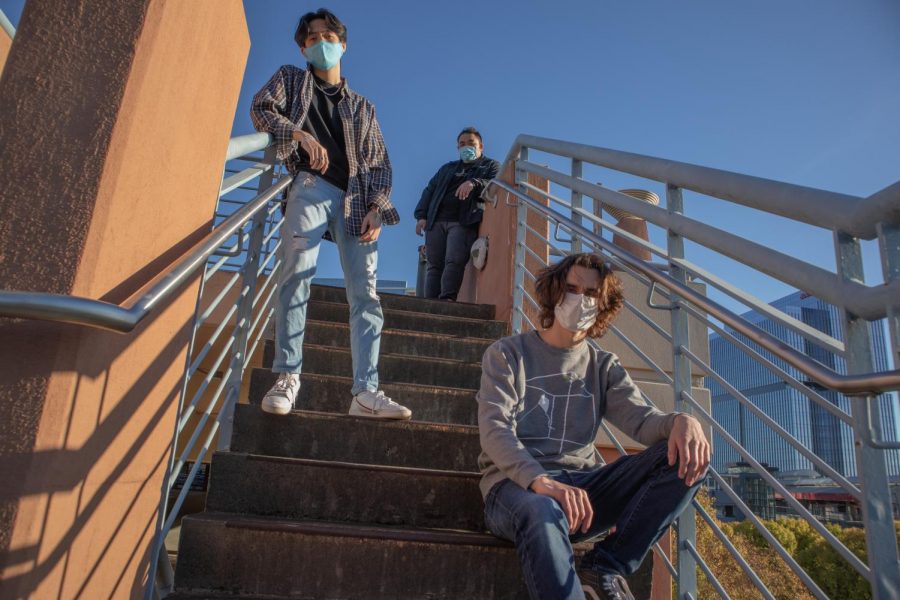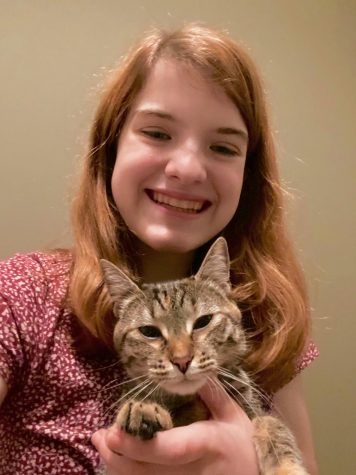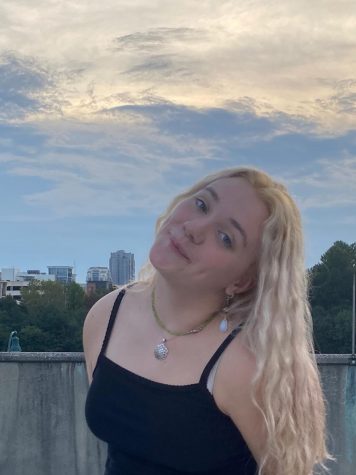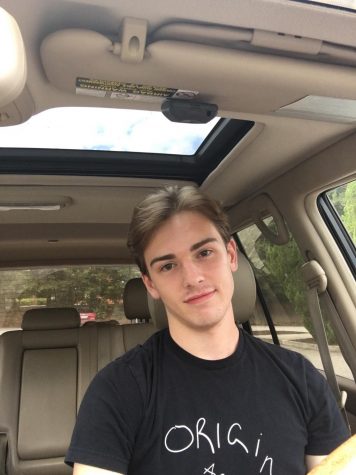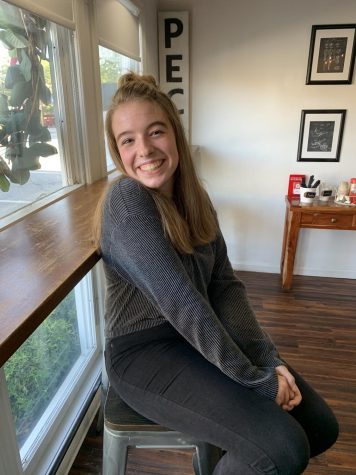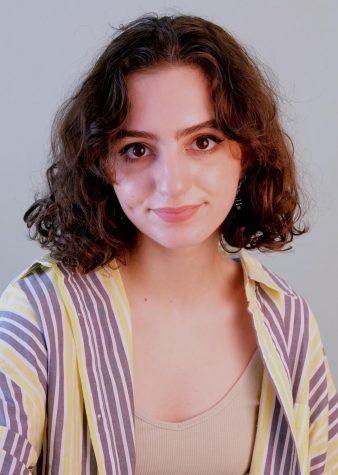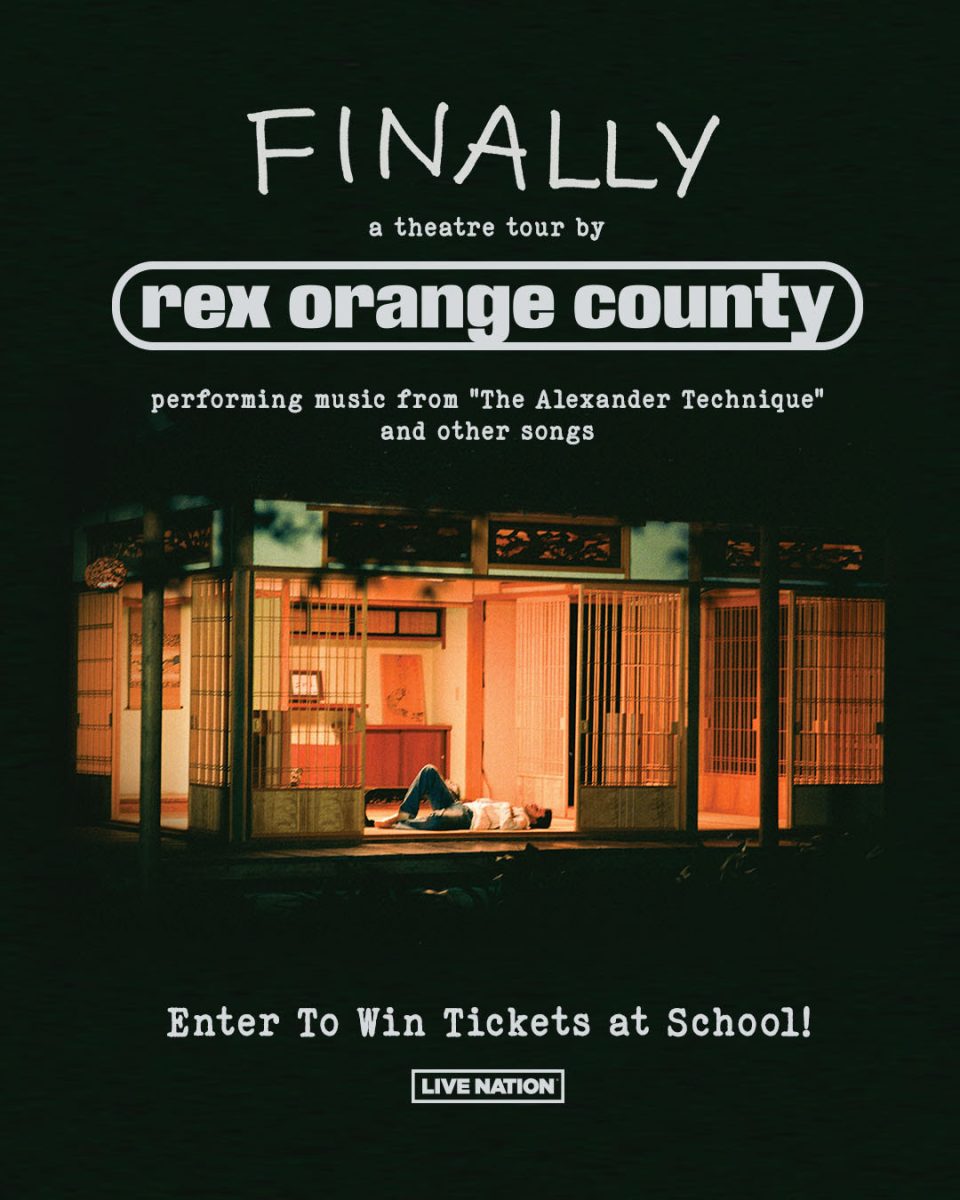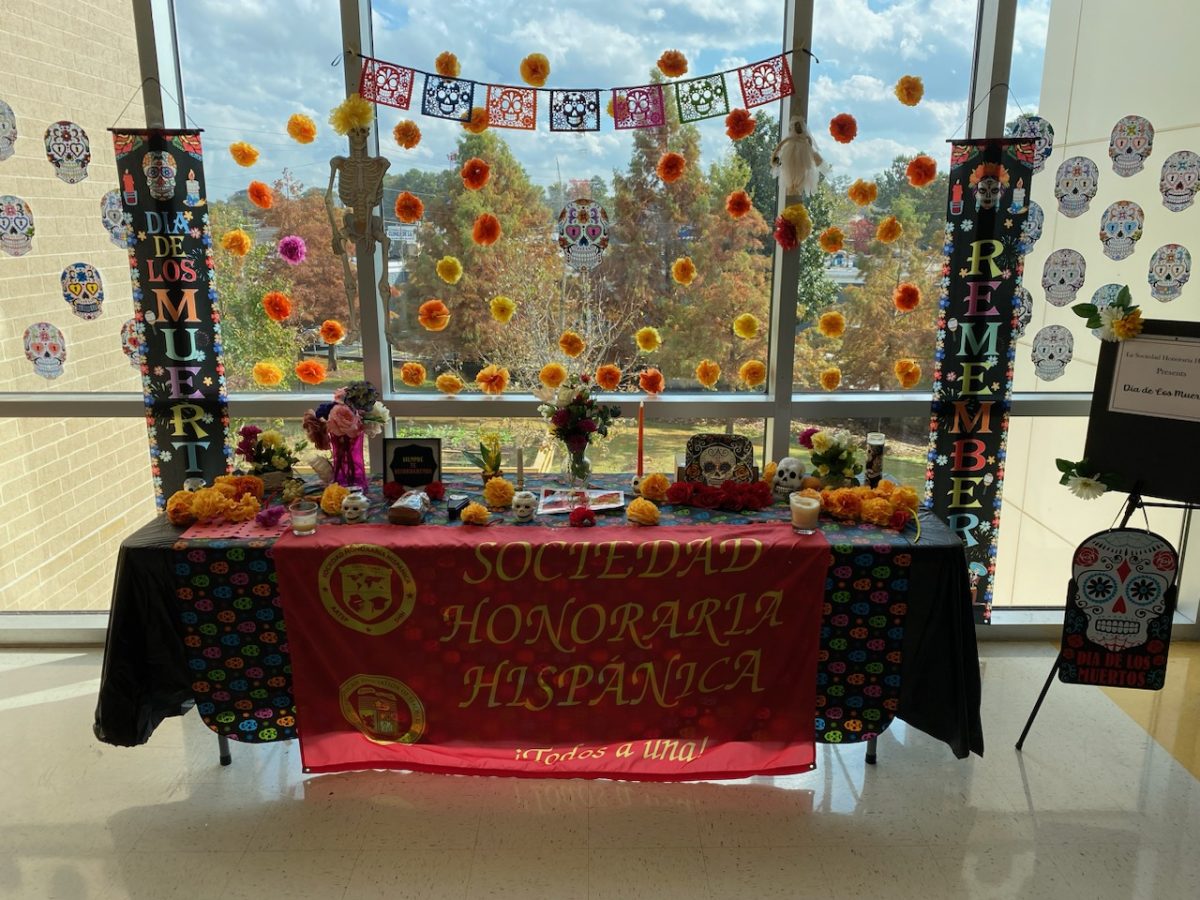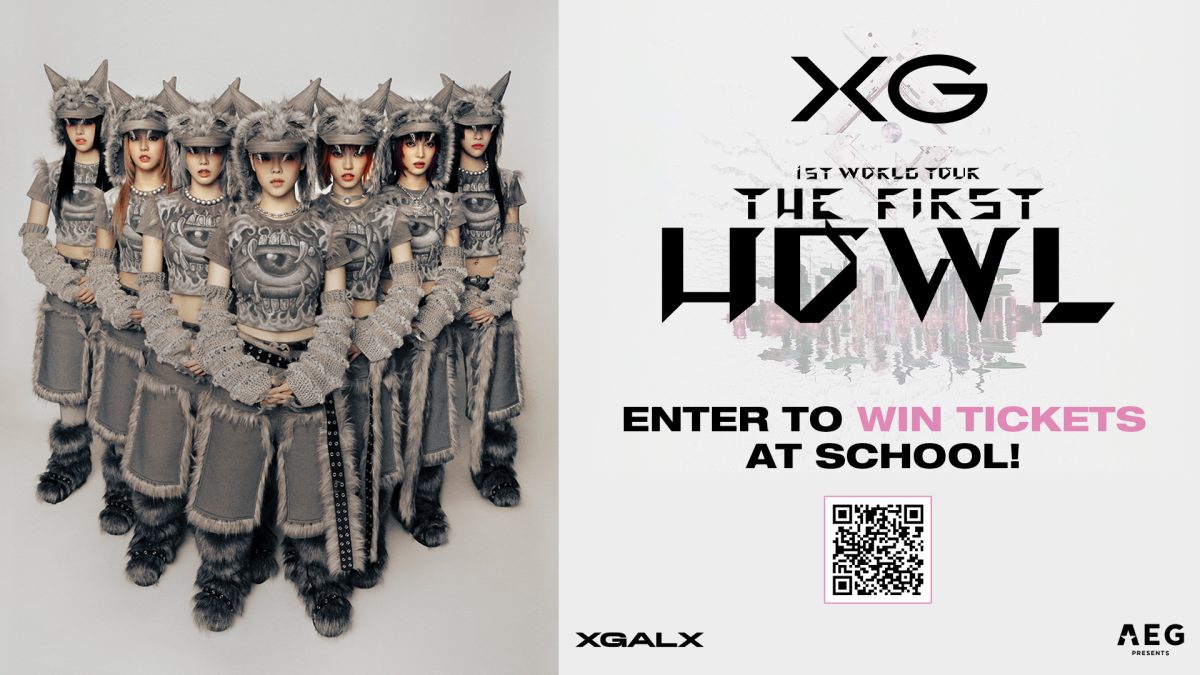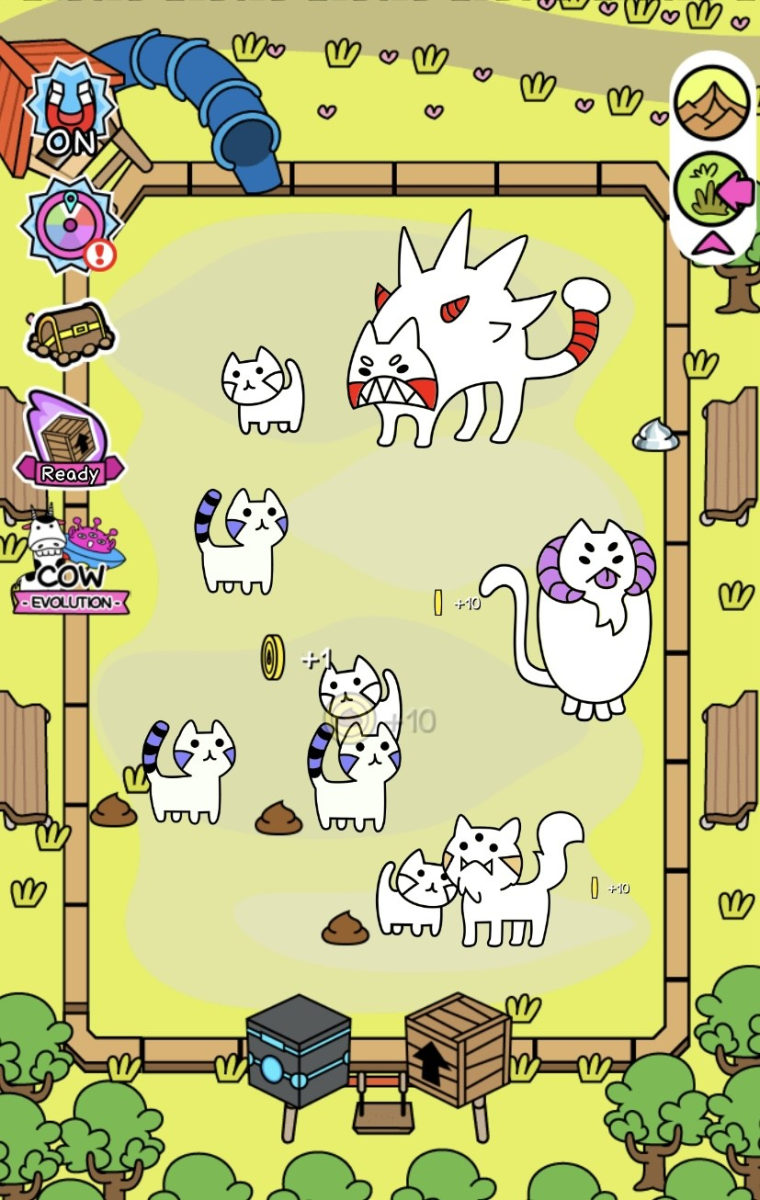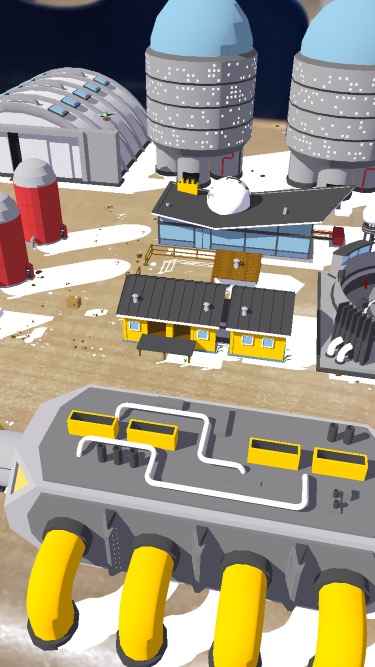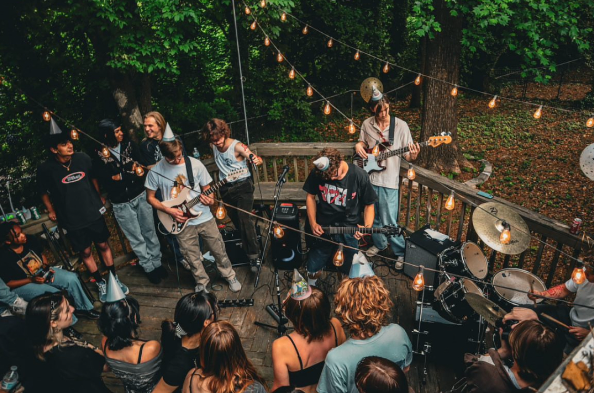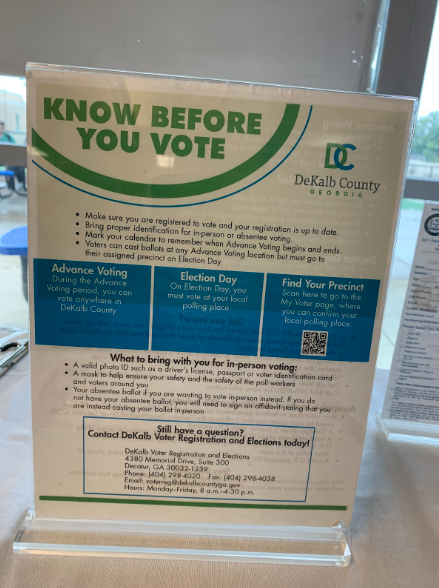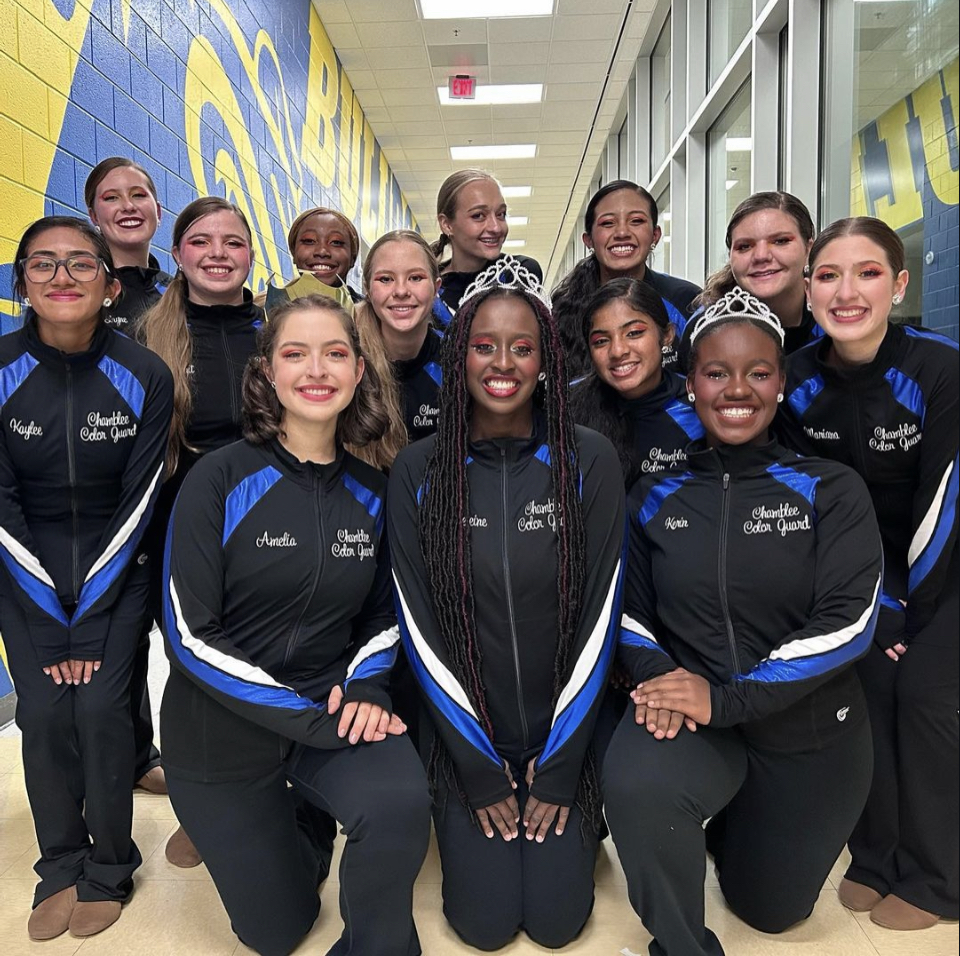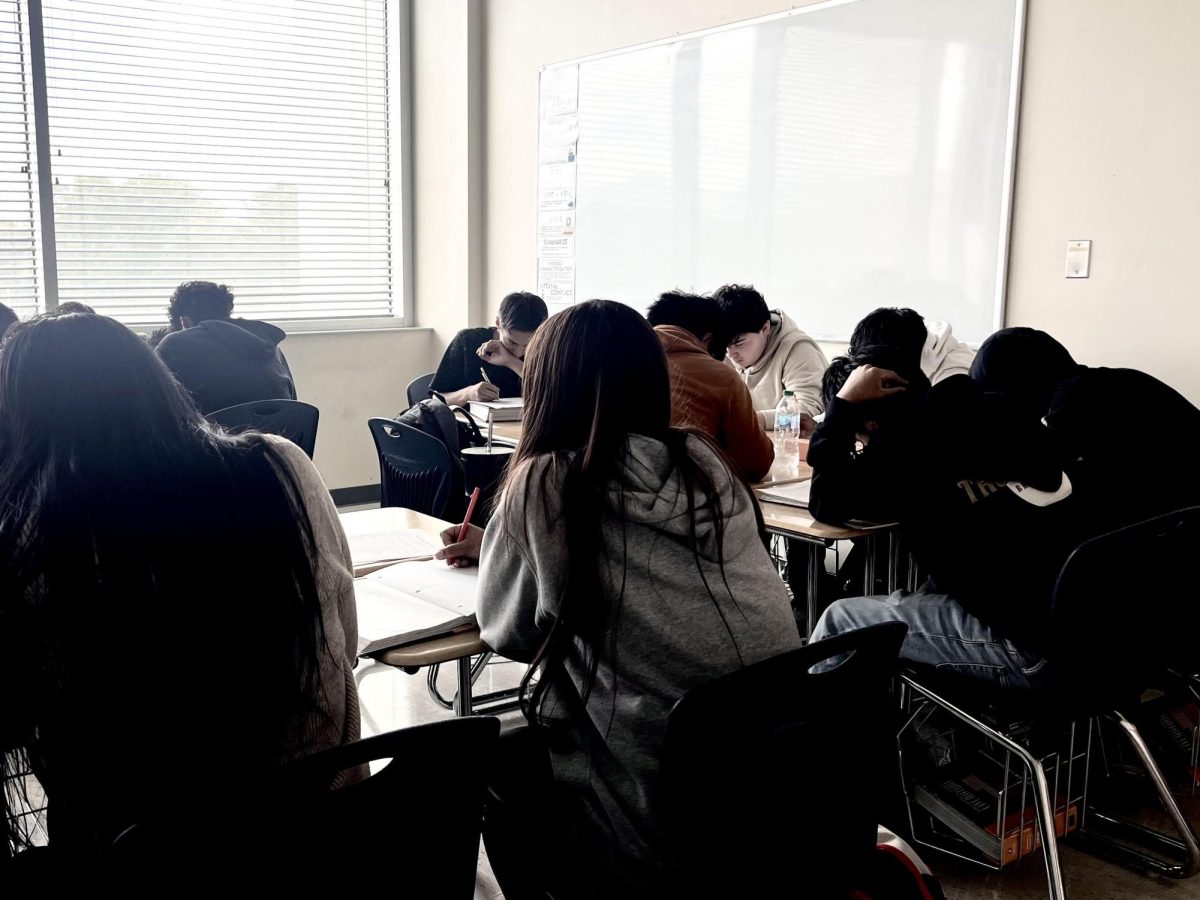2020 Visions: A Precarious Purgatory [August – November 3]
Photo courtesy of Henry Diep ('21)
COVID-safe quarantine photoshoot on the steps at Perimeter Mall’s parking deck; featuring Nolan Kurtzer (’21), Nic Yen (’21), and Henry Diep (’21)
January 28, 2021
[Editor’s note: Students were interviewed for the following in October, just before the 2020 Election. Though often speculative in nature, many of the election-related quotes featured here capture important perspectives of the student body surrounding what was then an upcoming, all-pervasive, and critically important event. Students are given an opportunity to reflect on the results of the election in the next—and final—piece in this long-term project. This installment covers August 17 to November 3. For other installments, see here.]
“I’m just bracing for impact in the months to come,” said Noah Cranman (‘24).
As the COVID-19 pandemic dragged into the late summer, Cranman’s cynical attitude was hardly unique. Many students found themselves on edge, wondering how to cope with the endless monotony.
“What I find weird is that I have so much time […] to just exist,” said Dylan Hariston (‘23). “I just don’t know what to do with that time.”
“In a broader aspect, I am happy that I’ve had time to self-reflect but the more I think about it, I start to think about at what cost that comes and all the freedoms that I’ve lost from quarantine in this summer,” said Jordan Beckford (‘21).
Back to School (At Home)
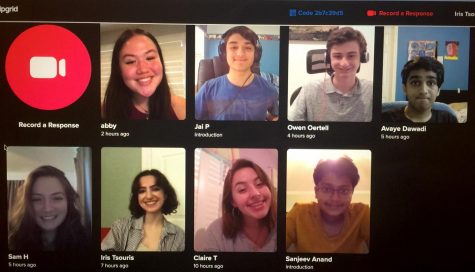
On August 17, school officially started for the 2020-21 school year, breaking up a seemingly endless summer. The coronavirus had claimed the lives of over 150,000 Americans, and the nation was averaging 1,000 deaths per day. DeKalb County Schools remained completely virtual, but more structure was created for online classes than in the spring, allowing for frequent synchronous Zoom sessions. Overall, students appreciated the increased student-teacher interaction but still struggled to connect online, as no one was required to turn their cameras on. As a result, many classes were black screens populated only with the names of students—and, in some cases, the teacher.
“I think it’s good that we now get to talk to our teachers,” said Toby Russell (‘23). “I still feel like we can’t as much, especially because a lot of people don’t wanna put their cameras on.”
“[I miss] actual conversation with people face-to-face,” said Joanna Louis-Ugbo (‘22). “That’s what hits the hardest once we are online.”
“You would actually participate in school when you’re actually in it,” said Spoorthi Satish (‘24). “Now that we’re virtual, mostly we just listen to [teachers], but then we have to figure it out ourselves and kind of teach ourselves instead of the teachers actually teaching us and being at school with actual teachers. It’s really weird.”
As students and teachers alike began to adjust to an increasingly nebulous virtual environment, many were struck by how many aspects of the typical classroom were missing.
“The biology classes, the science classes, the math classes are quite interesting when you are in-person rather than virtual. Because teachers do something [such as] labs in classes. And the sports things too… like the gym, and playing basketball,” said Muhammad Ifaz Rahman (‘23), “That’s all I miss.”
“The thing that is really shocking for me is that a lot of teachers [used to] do assignments that you need to do every single week,” said Russell. “Especially for language classes, like German, we had to do vocab every single week. But we just gave up on that. And a lot of teachers just gave up on the things that we did, like [my math teacher] stopped doing homework checks and all those things that I kept on thinking were part of my routine, and were part of my everyday life. They just went away and that was really, really abrupt, and it kind of freaked me out.”
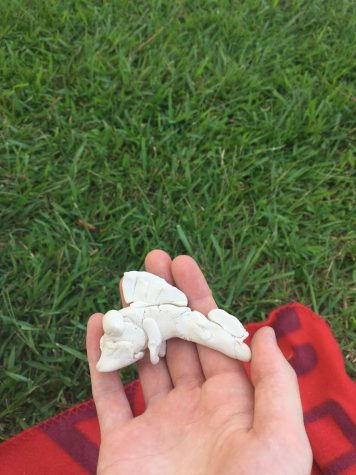
Without the reality check that comes with physical desks, four poster-decorated classroom walls and a teacher snapping for attention, learning became characterized as overly passive—to the point where students would often zone out during lectures.
“I miss class discussions. I miss learning some things from other people without really having to be close with them or anything,” said Deanna Sharpe (‘22). “Now, you’re on a call. And just the teacher talks for the whole time. Everyone’s too scared to talk. And even if there’s one person who’s talking, no one else wants to jump in ever. Because it’s awkward in the microphone timing and just all of that, so then you don’t really get to see people either. It’s just like a lot of not really feeling like you’re talking to anybody. You’re learning by staring.”
Often, students keep their webcams off in class meetings, whether due to peer pressure or comfort or simply the need to get other tasks done during class.
“On Tuesdays and Fridays, my first class is yearbook, and so I don’t really have to show my face,” said Louis-Ugbo. “I’m usually getting ready during that class. I’ll be brushing my teeth and washing my face during that class.”
“Having my camera off makes me more comfortable because the thought of other people staring at me makes me actively uncomfortable and makes it harder for me to focus and think about school, […] because that’s an extra thing I’m worrying about,” said Lou Mayer (‘22). “But when my camera’s off, I’m not worrying about that, and I can just pay attention to what’s going on.”
“I feel like peer pressure can make most people turn their cameras on, and then there are the select few who don’t really give in to that pressure,” said Kristina Perez (‘22). “I think a lack of cameras on can get rid of some parts of peer pressure due to the fact that a lot of people feel comfortable being the majority […] which is usually people with their cameras off.”
This webcam-off dynamic creates even more of a disconnect in the classroom, and it can strain the already challenging task of learning, especially with peer groups, through a screen.
“[When I] talk to [classmates] in breakout groups, barely, barely anyone turns their camera on,” said Louis-Ugbo, referring to the smaller group calls that teachers often assign within larger Zooms. “But if you did a group in school, everybody would be there. I never would be talking, but in breakout groups it is usually like one person talking, and then everybody’s cameras are off and then everybody [only] starts talking when the teacher comes in.”
“In person, there wasn’t really awkward silence every time the teacher spoke, the way that happens on every Zoom call,” said Nick Harrison (‘23). “If we go into breakout rooms, nobody talks, but in normal life, everybody would be chatting about their day or their clubs.”
“As much as I don’t like turning my camera on, I think it would be nice if it was a requirement,” said Sophia Shi (‘24). “Obviously, a lot of people are going to disagree. But also, some of my teachers will use breakout rooms. And I’ll enter the breakout room, and sometimes I’ll be like, ‘Okay guys, let’s start when you’re ready.’ And then, no one will respond. So, then I’ll just be like, ‘Okay. For question one, this is what I got. What’d you guys get?’ And no one will respond again. They all have their cameras off, their mics off. I normally like group work. But with virtual, I think it’d be more efficient for us to work by ourselves honestly.”
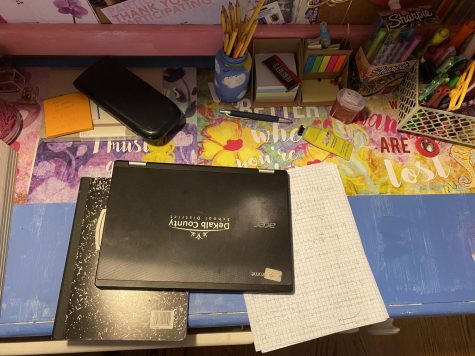
Teaching to a checkerboard of icons, rather than faces, also makes it difficult for teachers to recognize and empathize with students.
“I was actually talking to [my physics teacher] this morning, and she kept asking me what period I was in, and I kept saying, ‘third period, third period,’” said Louis-Ugbo. “[She told me] it’s a lot harder to figure out which class students are in because [she] never sees [our] faces. I’m not about to turn on my camera, but I was like, yeah, I agree with you. It’s kind of hard to get to know your students. And I also feel like that sucks because when we need teacher recommendations this year, it’s going to be harder because your teachers don’t really know you. They know the assignments that you turn in at 11:59 p.m., but they don’t know who you are as a person.”
However, several students have found a silver lining in the Fall 2020 semester. Because Chamblee High School implemented a block schedule with synchronous Zoom sessions on Monday, Tuesday, Thursday, and Friday, the school day shrank from seven hours to around four, while giving students the entirety of Wednesday off. This added time became a saving grace for many students juggling the stress of an upturned lifestyle.
“What I really like about virtual class is being able to sleep in. It’s pretty nice. Classes start at 9:45 in the morning for some people. For me, since I don’t have periods one through four [because of dual enrollment at Oglethorpe University], I just get to sleep in,” said Emma Hall (‘22). “I don’t even have classes on some days. I just get to be asynchronous. […] I do have to deal with a philosophy class [at Oglethorpe] where I have to contemplate the meaning of life at like 8 a.m. in the morning though.”
“The good part is building my own schedule because I’ve gotten pretty good at that,” said Luca Antinozzi (‘22). “A lot of teachers have been really flexible. And then, if teachers don’t want to be flexible they kind of have to be, because there’s so many factors that they just can’t control. So that’s a really good part, and overall, my classes are going pretty well.”
With more flexibility, some see virtual school as more manageable than in-person school and have been able to improve their grades through their newfound autonomy.
“It feels like I have so much more time because the transition time and going to school by driving or the bus takes up time,” said Shi. “At home, I just have a bit more control over what I’m doing. I can eat breakfast at 9:45 or something like that, instead of having to be in school already.”
“It’s a lot easier this year and my grades are a lot higher than they would be if we were in school,” said Louis-Ugbo. “Ending school at 1:50 and having Wednesdays off has been really helpful. It gives me time to catch up and take a break and take a breather.”
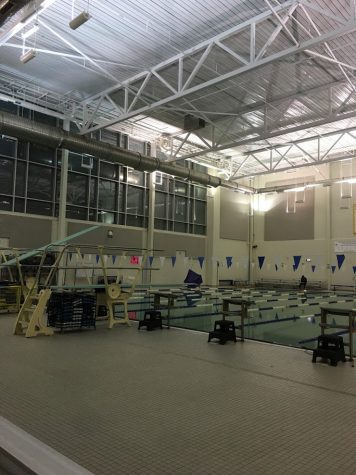
“I’m doing better in school than I ever have which is weird, because a lot of my friends are doing worse. I think that [came from] people distracting me [when I was in school], and I didn’t like being in a random place for eight hours, and then having to go home and do stuff based on that random place,” said Katie Mogilski (‘21). “I feel like when I’m at home, I can just do things at my own pace and no one’s hovering over my shoulder and I’m responsible for myself. I’m proud of the work I do.”
Learning from home also comes with comfort.
“It’s good to get up in the morning and stay in my comfy pajamas and go to my classes without having to go to a cold building and sit in a hard metal chair. That’s definitely nice to be in a comfortable environment to do it,” said Harrison.
However, others worried that the decreased class time harmed their long-term learning—and it placed a lot of the burden of understanding content on the student.
“Overall, I don’t really like [virtual school], because there’s not enough time to really learn a lot of material. You have to learn a lot of it on your own and the teachers can’t really tell as much as they usually would in detail,” said Isabelle Coursey (‘24).
“I guess I get things done. It’s like a routine for me, but I don’t retain any information. I’m doing all the work, but the teacher would ask about it in class the next day and I would not know what I did yesterday,” said Victor Lim (‘21). “I feel like just because the environment is where the concepts aren’t repeatedly taught and used, it passes by, and it’s hard to learn for me.”
“I just feel like we’re learning so much less right now, which is not good,” said Megan Woo (‘21). “I feel like classes are so short and teachers are limited in what they can actually teach, so we have to go and teach ourselves a lot.”
The ability to instantaneously assign and grade work is a double-edged sword. While students have more flexibility, it is easy to feel overwhelmed.
“I personally feel like the workload is either really good or really bad for the day,” said Sharpe. “I feel like it’s not spread out well. One day, there’ll be like, nothing to do. And then the next day, it’ll be five different assignments stacked up together. Some teachers will […] pile up assignments on a really random day, and then tell us there’ll be a test or quiz next day. And then, I don’t have the time to prepare for that. […] That would normally never happen in in-person school, because you could at least gauge what the teacher is planning to do at least a little better. It’s been kind of hard, but sometimes it’s really good. But other times, I’ll just feel overworked.”
Combined with the lack of motivation that can come from such an open-ended schedule, some students ended up having to address a lot of missing and late assignments. Across the student body, many grades decreased significantly and faced the prospect of not earning credit for the semester.
“It hasn’t been the best,” said Kendall Young (‘21). “It’s been hard to actually sit down and focus to do all the work. It feels like we’re getting assigned more work than we would be if we were in person.”
“[I miss] classroom structure, because when I’m at home, I can’t bring myself to do any work. Hence, my 50 million missing assignments,” said Alex Dyer (‘23).
“Before quarantine, I was a huge procrastinator,” said Ashley Michel (‘21). “I barely did the bare minimum for work. With quarantine, either you get it done, or you don’t. And if you don’t, the consequences are lethal. So it’s been pushing me to stay on top of everything, making sure I have all my assignments done.”
Communication is also challenging.
“Nowadays, if you want to talk to someone, you have to figure out how to email them or find some weird way to get their contact information,” said Jahin Zashim (‘23). “[If we were in school, I could say] ‘Hey, I don’t understand this.’ And then your classmates would say, ‘Hey, I can help you understand this.’ And you could ask your teacher or go up to them. But now it’s like ‘Oh, I’m gonna write you a super formal email and then I’m just to wait so long for you to reply back.’ So [I miss] just the instant quick interactions.”
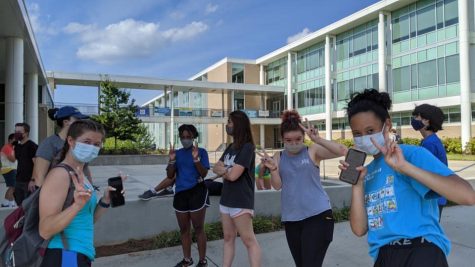
Some have managed to strike a balanced perspective, situating an unideal learning environment in the context of the raging global pandemic.
“[I’m happy] I’m not getting a disease,” said Ariel Raggs (‘21). “I do much prefer in-person learning. I’ll be honest, it’s so hard to pay attention. I’m trying so hard. I’ll sit in the class and I’ll answer the questions, and I’ll finish and I’ll have no idea what we learned. I’ll have to go back over the PowerPoint. I’m not a fan, but it is what it is. It’s not awful. It’s not the worst thing that could happen.”
“It’s been okay. It’s not too bad since I know why we should be at home,” said Myles Allen (‘22). “[With virtual learning] I can move at my own pace, so if I wanted to do work for the next couple days I can do that, or if I wanted to chill for a bit and catch up one day, I can also do that. I honestly can’t really say anything about it that’s been worse other than me being able to be lazy with turning in work.”
“It was definitely a lot better than I expected,” said Woo. “I felt like the teachers were organized for the most part, and I felt like they had an idea of what everything would look like. With that being said, there’s been a lot of challenges and a lot of things that just can’t be very good about virtual learning, like you’re so limited in what you can do, and I just don’t think that can be changed very much. So with the technology we have, it’s actually pretty good.”
Socially Distant
Online school is more than grades and exams. For most, the Fall 2020 semester has felt definitively lonely, and practically every student interviewed mentioned how much they missed their friends.
“I’m a very social person. I definitely miss people, just random people, not even my close friends. And teachers. I miss them too,” said Michel. “I’m also a cheerleader. So [it’s hard] not being able to attend sports [even though] we do have football season. But it’s not like regular times. [I miss] everything on that level also, like no after school activities… and being a senior, we would be having our senior breakfast around this time.”
“I’ve never really had a phone with cellular service […] so I’m not really connected to other students, electronically and virtually,” said Cranman. “I have a lot less social interaction than I would at school and I think that’s also a big part of school, is the fact that it’s a social experience.”
“I miss seeing people that I’m not super close to. And friends that I wouldn’t really hang out with outside of school,” said Olivia Mitchell (‘22). “And especially like those smaller friendships that I feel like nobody really has anymore.”
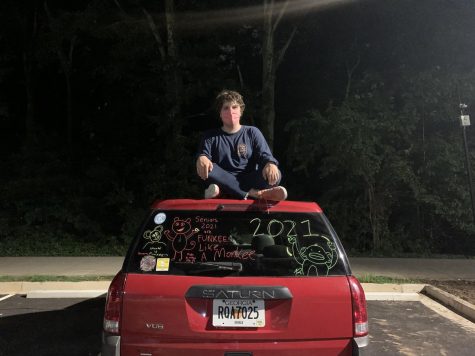
For seniors especially, the 2020-21 school year was something to look forward to, a chance to relax and gain meaningful, cumulative experiences before moving into the next chapter of their lives. Many recalled pre-pandemic moments that have taken on new significance, as they reflected on a half-baked senior year.
“[I miss] hanging out with my school friends and playing sports because that was the majority of my social interaction,” said Raggs. “I’d come to school. I’d hang out with my friends. I’d train year round. I’d run my sport. That was the highlight of my year. Everyone has something they’re really good at. Winning just felt so good. It was the best thing in the world.”
“I miss my theater classes. And I miss seeing my favorite teacher, Miss Gilliam,” said Mogilski. “Because when I was in school, I had such a bad attitude and I didn’t want to be there. Now, I definitely miss seeing Miss Gilliam and doing senior stuff like pep rallies and games I missed out on.”
“I just miss every aspect except the increased work aspect. Part of me still wishes I was still climbing stairs every day and doing [my calculus teacher] Ms. Tulchinsky’s work,” said Lim. “I just took things for granted. I feel like everyone feels that at this moment, right?”
On the other end of the timeline, freshmen have struggled to integrate into the Chamblee High School environment—a community built around the 3688 Chamblee Dunwoody Road building they never set foot in.
“It’s my first year of high school. I feel I haven’t even met that many new people because it’s really hard to reach out online if you don’t know them before,” said Shi. “I don’t even really know who still goes to Chamblee High because a lot of people, after middle school, they go to different other schools, they transfer, and I also don’t know any of my new classmates.”
“It feels kind of weird. I still feel like I’m in middle school,” said Gabriella Mayes (‘24). “It doesn’t feel any different. There is a lot of miscommunication sometimes, especially because I am going to a completely new school and I haven’t even been to the school yet.”
Many students have improved how they connect with their friends since March, whether virtually or through socially-distanced get-togethers.
“I text and call people more because before I almost never checked my phone, and now, although it’s a little unhealthy, it’s the only way to connect to people,” said Lim. “I do occasionally see people and go on walks, but that’s a once in a while thing. So calling people would be my way of adjusting.”
“Since Wednesdays are off, I have been seeing some of my friends,” said Esha Pamidi (‘21). “We wear masks and we distance and it’s just the same small group of us. We don’t go see anyone else. So, it’s a lot safer, and I guess that’s really nice because I get to get out of the house and we get to talk to each other for a little bit and it’s sort of normal, like how we were in school.”
“It feels as though the restrictions have loosened a ton. On one hand, it feels back to normal, but on the other hand the masks are keeping it from coming back to normal,” said Dyer. “It’s just that occasional reminder to say, ‘hey, social distance’ that is sort of a snap back to reality, [reminding me] ‘hey, we’re still in a pandemic.’”
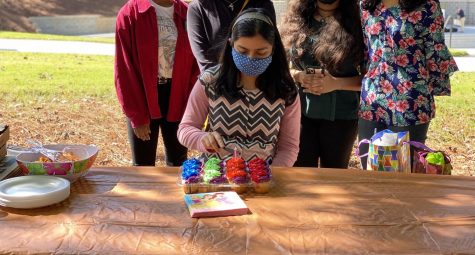
For many, quarantine has fundamentally changed friendship dynamics.
“The whole thing with not being able to see anybody just makes me realize how few friends I have,” said Jonah Bosselmann (‘22). “I’ve only been hanging out with a select few people.”
“What feels kind of wrong is just not seeing [a large] amount of people. Having friendships with people has to be almost forced,” said Antinozzi. “It’s not just like you see someone every day so you just interact with them. It’s like you’re actively trying to be their friend or they’re doing it to you. It’s a very different dynamic than just lots of people that, you know, that I would have called friends, but I haven’t talked to them in six months. That still feels wrong.”
“I don’t think I registered how lonely I actually was,” said Colette “Coco” Bradford (‘23). “I was calling my closest friends every day because I just call my friends all the time. And that was just transferred over from the regular school year because I normally did that. So I was like, ‘Yeah, it’s fine. I’m just calling people.’ I didn’t realize [I was] talking to, like, a fourth or less of the people that I would normally see.”
Even a trip to a store or estate sale is an excursion.
“When I go to stores, I see myself getting annoyed at people who don’t stay away from me or who go through the aisle that says to go the other way,” said Mogilski. “I tend to get really upset with people when I was out and I feel like before, I would just mind my own business and not even look at them. But now I feel like a need to call them out on it.”
“I feel like I’ve always been very germaphobic,” said Mitchell. “Mostly, the fact that other people care now is the biggest change. Sometimes, I just walk into a store and I see everyone in a mask and it’s just like, whoa. Life usually feels normal, but then sometimes you just walk in and it looks weird.”
“I’ve been going to estate sales and it’s amazing,” said Antinozzi. “I find so many awesome things, and I went to one in Sandy Springs and there was some rich family that randomly lost all their money. And I got like all these really nice sweaters and a Burberry jacket for $15. I like getting things that are weirdly personal.”
Looking Ahead to the 2020 Election
Just as students began to settle into this ‘new normal,’ many found a new source for upheaval. As the fateful date of Tuesday, November 3 approached, the upcoming 2020 Election and its potential sweeping consequences began to weigh on them. Those who could vote faced a choice for president as well as two U.S. senators to represent Georgia, plus a plethora of down-ballot races.
“I definitely think voting is really important this year. It’s been pretty controversial. I think this has had the most high tensions,” said Sophia Kim (‘23). “And it’s pretty important to vote for this one because afterwards it’s going to be pretty chaotic.”
“I think both parties are trying to save [the situation]. Their [policies] are the ones that can bring us out of this recession, whether it’s economic or social. And I do feel like the current administration has not been doing it well enough,” said Cranman. “I think there has been a major disconnect between science and the government. That was the main thing that I [thought] we should all be able to agree on: certain policies like if masks can save 50% of the people who are being diagnosed with coronavirus, then why doesn’t everyone wear a mask? It’s simple things like that that I feel like need to be followed so we can overcome this and get back to a sense of normalcy and not have to be scared of this virus.”
The first 2020 presidential debate was, in CNN’s Jake Tapper’s words, “a hot mess, inside a dumpster fire”—with President Donald Trump and Former Vice President Joe Biden interrupting one another and bickering like “children.” Needless to say, the event was extremely eye-opening for the Chamblee community.
“The debate was really upsetting and you almost want to laugh but then you remember, ‘Oh, all these are the people running our country,’” said Woo. “These are our choices for president and it’s just disappointing.”
“I did watch the debate and it was quite the experience,” said Lim. “It’s like a perfect depiction of what a mess our country is right now. Anyone has seen the debate even if they’re not American: my family in Malaysia called about the debate.”
“I’ve been more focused on the presidential election more than anything,” said Hall. “I’ve watched the vice president and the presidential debate and they were both train wrecks. They were so bad. They both acted like such children.”
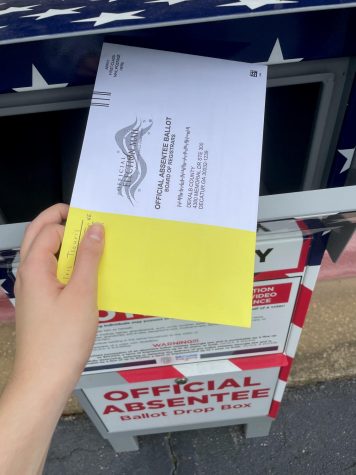
For the most part, the students interviewed expressed preference for Biden over Trump, even if they chose to “settle” for Biden rather than outright support him.
“The two candidates are not the best, but in my opinion, there’s an obvious choice of who should be elected, and I’m a little worried about that,” said Allen. “Biden is okay but he’s still not great, but then you have Trump… well, you know. I believe Biden is the lesser of the worst, so damage control basically.”
“Trump very much bothers me,” said Antinozzi. “As far as his actual policies, the things that I have the biggest problems with, that I actually think Biden is better for, is conservation and climate change. But as far as the pandemic, and social efforts, I don’t think institutional Democrats are really that much better. The really big thing for me would be conservation.”
“Both candidates have a lot of issues and stuff they need to address and fix but […] there’s a better candidate in Joe Biden than I think there is in Donald Trump,” said Beckford. “I feel like there’s a lot at stake from basic human rights to healthcare because I know Trump is saying he’s trying to cut a healthcare plan that millions of people rely on and he has no proposal to fix it or anything. I think there’s a lot at stake and this election is very important after what we’ve seen happen these last four years.”
“We’re settling for Biden, because he’s definitely not the best presidential candidate, but he’s better than Trump,” said Michel. “There is choosing between bad and worse. And I’d rather go with bad than worse.”
“It’s about what we will allow to pass as leadership in our country,” said Young. “Whether or not there are enough Americans who don’t want a white supremacist as president for another four years.”
Many recognized the division the election has created within their family and friends.
“I personally can’t imagine a world where we have the president we have now for another four years. I hate how it feels like everyone is just split and believe either you hate the other person, or you don’t actually believe it. And who you support determines all of your beliefs,” said Mogilski. “It’s true in a way and I appreciate people’s passion. I think that it’s important to have passion for stuff like this but it is getting to the extreme, and I kind of hate to see people losing all ties with each other based on this, but I don’t know. See, on one side, I want to like people who have their own political opinions. But also, I’m like, ‘If you vote for Trump, you’re a white supremacist.’”
“My parents are voting for different candidates so they fight a lot which is really annoying, but I definitely understand the weight this election has,” said Dyer. “I see a lot of campaign stuff on social media. […] I feel like there’s less centrism nowadays and more radicalization.”
“I would 100% vote for Biden, because, unlike Trump he 100% believes in climate change, and you know like he actually has a brain in that kind of department,” said Hall. “I actually come from a family full of a lot of conservative and Trump supporters. So it’s really hard for me to show my beliefs openly in my own household and whenever I do, I get into an argument with someone from my family, whether it’s my mom, my dad, or some other relative. But I openly say that I’m a leftist even though my grandfather likes to get onto me for that a lot. I wish I could show my beliefs more openly but it’s kind of difficult.”
“I think this country has been divided between, not just Republicans and Democrats, but people that have common sense and people that don’t,” said Mitchell. “There’s so much more at stake this year.”
Other students, though, managed to detach themselves from the election.
“I actually don’t care about politics. I’m not interested in that,” said Ifaz Rahman. “It’s there. The people are running, and whatever happens happens.”
“I don’t pay that much attention to politics. I feel like I wouldn’t even vote because it would just be a waste because I wouldn’t really know anything,” said Satish. “Even if you know something, I predict, it’s like the bare minimum of observations we can make.”
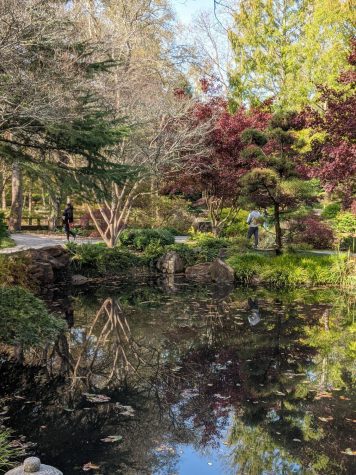
Yet others strived to be as involved as possible.
“I’ve been very active about learning and trying to educate people as much as possible for the 2020 election,” said Louis-Ugbo. “A lot of opportunities were available this year. I became an ambassador for the program called ‘When We All Vote.’ Basically we’re just trying to get [17-and-a-half year-olds] to register to vote. So once the election comes for next year, you will be able to vote. I also work on Jon Ossoff’s campaign right now. […] I’m also always posting something on [Instagram], trying to educate others, because I know not everybody’s going to be watching the news, and finding informational and accurate posts.”
“Let’s make sure people go out and vote because I see some people who would definitely lean more for […] Biden. But because they don’t like either candidate, they’re just not going to vote and it’d be better to at least settle [and not] just sit around and then be upset when the results do come out,” said Sharpe. “I try to encourage my older family members to vote, but that’s really all I help with, because most of my friends are not that age yet.”
“I did voter outreach. Mostly, I do behind-the-scenes work for organizations that do voter outreach, because my mom does that,” said Raggs. “She does it and I do it with her because it’s a good thing to get done in trying to convince people to vote for Joe, because he doesn’t want to take our rights away. Maybe he’s not the greatest, but he hasn’t outright stated that he wants to steal the rights. So at this point, it’s just such a mess. Like, there’s a lot riding on it for literally everyone. We’ll see. We’ll see how it goes. We can hope.”
Anticipations and Trepidations
As 2020 began to draw to a close, students expressed countless hopes for the coming months—many of them election-related.
“I’m hoping [the election] goes the right way,” said Michel. “I’m expecting the worst, because it’s only been the worst. I’m hoping I’m not going to speak [it into] existence. But that election is going to be the first thing of the last month, and then the holidays are coming around, and I don’t have any expectations for that. Just because 2020 has been so bad. So 2021, I have my high hopes. But I’m not hoping too high, but just hoping higher than what we had this year.”
“I hope that Joe Biden wins the election, so we can at least, get this under control a little bit, or have just some sort of rule in the country to help,” said Mitchell. “I just hope that we can finally get something under control, whether it’s mask mandate, or vaccines, or whatever, and just get Donald Trump out of office, so he can stop preventing people from getting better. I fear that he’s going to continue to get in the way and people are going to continue to mess this up but I really hope that we don’t.”
“I’m hoping it won’t go as crazy as I’m expecting it to go if it turns south because there’s already talk about the chances of groups coming out and getting upset depending on what result may or may not be,” said Sharpe. “I’m just hoping that doesn’t arise regardless of which way it goes.”
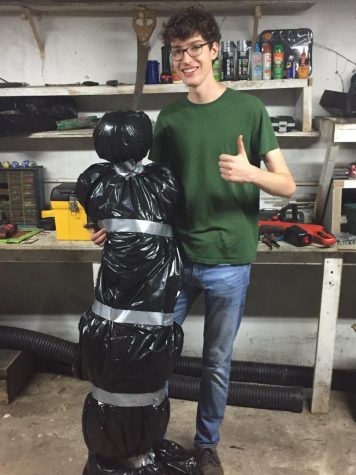
Others wished for a more conscientious public and a speedier end to the pandemic.
“I really hope people wear their masks so this can be better,” said Mogilski. “I feel like if people just give in and comply with the codes and conditions of everything, then this will end eventually. We are not even near the finish line, but I feel like they just really need to open their eyes to what could happen if they just give in a little bit and listen.”
“People are getting more conscious about their health. They are actually wearing masks and gloves, and they are actually social distancing. After all, there are so many people getting killed and dying from COVID,” said Ifaz Rahman. “I think it’s really a good thing because people are actually getting conscious about their health. So they are ‘we have to save a life first.’ I see many people out there, 90% of them wearing masks. It’s a good thing. People are concerned about themselves. That’s how COVID will get over soon.”
“We’re coming up on flu season. My main concern is that people are not going to stop partying at their college campuses and stuff like that,” said Bradford. “Nobody’s stopping. It never slowed down. Now that it’s flu season, […] which seems like it might correlate [with COVID], it’s scary.”
“My hope is that COVID eventually passes over and we don’t have to worry about a pandemic for a long time,” said DeSimone. “That’s my only hope. I could almost care less about anything else happening. But if COVID leaves, I think everything will be a lot easier to fix.”
Returning to school is also on students’ minds. In September, DeKalb County announced plans to phase in staff and then students to classrooms based on the number of COVID-19 cases in the county. But that plan was quickly scuttled when cases numbers began shooting up following the Labor Day weekend.
“I hope we can start being in big groups again but I’m also scared that that won’t happen for a long time,” said Young.
“They already have a plan for people to go back to school,” said Bosselmann. “At this point, it’s not really that worth it, in my opinion, at least. Because it’s going to be the same. The teachers are doing virtual in class. And then there’s also a few students sitting in there. I hope that the situation gets better enough so that we can go to school safely and then in a productive way.”
Many hoped for 2020’s heightened level of activism and the Black Lives Matter movement to continue into 2021.
“One of my hopes for next year is this racial awareness that we are now in will continue. And just the awareness of people in marginalized groups in society,” said Louis-Ugbo. “I hope the fight stays, like, alive till next year.”
“The main thing is racism; it’s killing more people than COVID,” said Ifaz Rahman. “You know, racism is a very, very bad virus. It’s actually a virus among people.”
Others focused more on their immediate goals.
“I’ve always been scared of bad grades, so I guess like a B or something in one of my classes [would be bad],” said Hall. “I’ve been told not to get my hopes up about anything so I don’t have any hopes. Bad grades, that’s pretty much it. My only concern, my only worry. It’d be worse if I died, but I mean, that’s pretty much it. But you know, I mean like if we’re looking at it objectively, if I did die, I would have ended it with good grades.”
“I get to graduate in May next year and that’s pretty exciting,” said Beckford. “I’m just getting closer to graduation and getting to apply to colleges.”
“We’re getting closer to the end of the football season, and I wanna win the state championship,” said Allen. “We’re currently 6-0. I also want to get scholarship offers, for now I’ve only gotten a follow from some coaches or an acknowledgement from a coach. My dream school is Miami.”
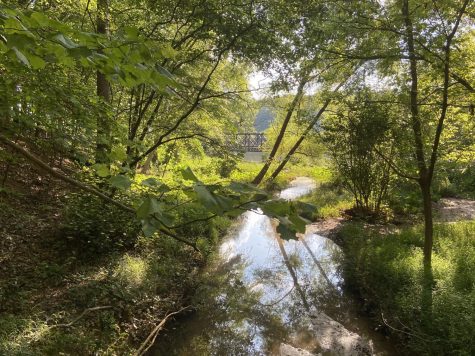
Overall, as the general election neared in early November, the Chamblee community was looking ahead and wanting to leave the majority of 2020 behind them.
“I’m concerned that it’ll get worse, because this seems like the worst it can get, but 2020 just keeps getting worse,” said Allen. “At the same time, I’m still trying to keep a positive outlook. I hope it’ll get better, I have a lot of goals to reach this year, so I’m hoping to hit those.”
“I really hope that 2021 isn’t as bad. Every single month there’s been something going on that’s just been really catastrophic for like either the world or the country, whether it be the fires or whatever. It’s kind of all been surreal,” said Russell. “I’m looking forward to wrapping everything up and trying to move on to whatever’s next in 2021. I just hope that everything will turn out okay. With all the issues happening all the time, people have realized them more and they’ve tried to advocate for them more. […] I really hope people [continue to] actually work to change it and fix it.”
“I don’t know how worse 2020 can get. But then yet again, we were all thinking that in March, and then we got murder hornets and protests and literally everything [that] could go wrong. So I’m ready for a civil war,” said Harrison. “I’m not doubting that’s going to happen, because, honestly, this is where 2020 is headed. But if 2020 is just a trailer for 2021, I’m going to be mad. I hope when 2020 is over, everything just magically disappears.”

